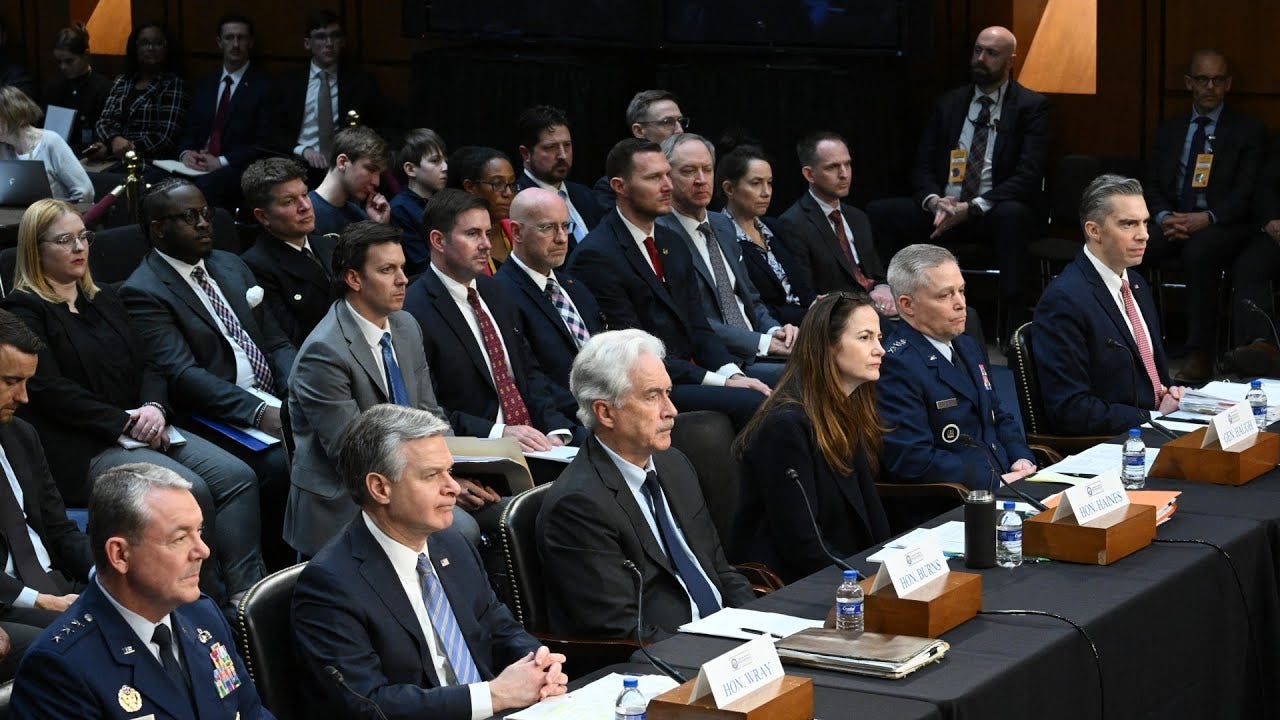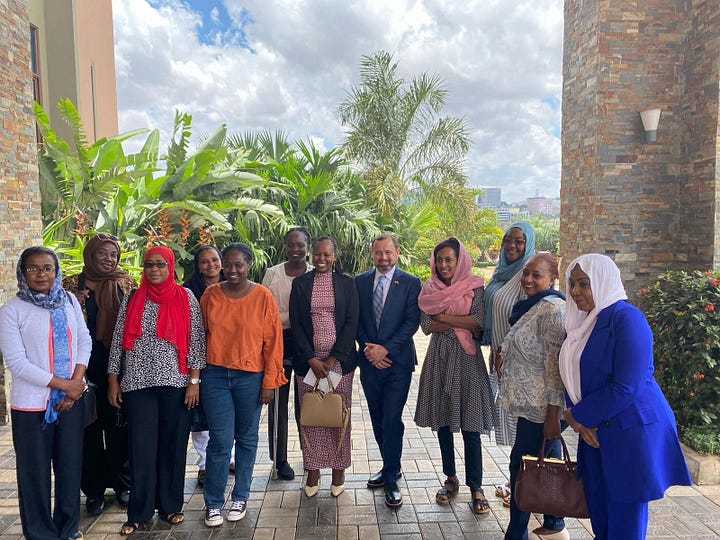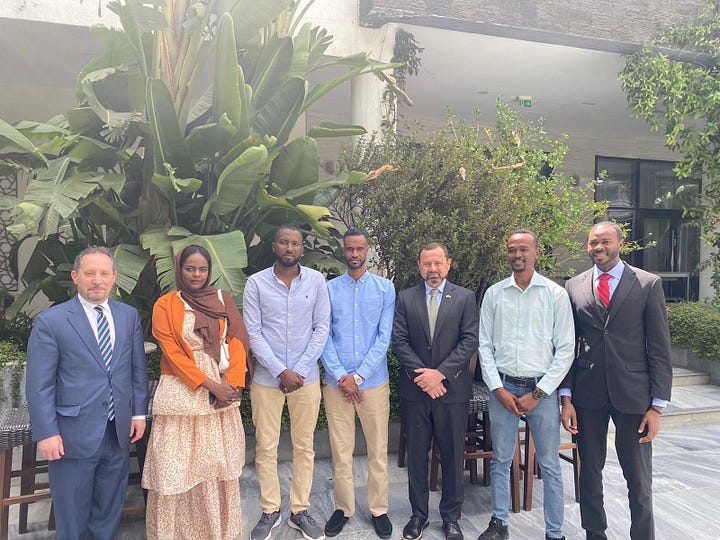CIA: Sudan risks becoming terror haven
Plus: RSF lose more territory in Omdurman

What’s at stake in Sudan’s civil war? Most immediately, the fighting poses risks of famine, disease, a massive and growing displacement crisis, and state collapse. The catastrophic human toll of the war is a consistent focus of this publication.
Longer term, there are also potentially global and regional consequences. A report this week by United States intelligence agencies warned that Sudan risks becoming an “ideal” environment for international terrorist and criminal networks.
The report, the 2024 Annual Threat Assessment of the U.S. Intelligence Community, was published by the Office of the Director of National Intelligence, which coordinates the work of the Central Intelligence Agency (CIA) and other agencies. It also warned that Sudan’s war could spread beyond its borders:
“Prolonged conflict heightens the risks of conflict spreading beyond Sudan’s borders, external actors joining the fray, and civilians facing death and displacement. The Sudanese Armed Forces and Rapid Support Forces are still fighting because their leaders calculate that they can achieve their goals absent a negotiated cessation of hostilities. With Sudan at the crossroads of the Horn of Africa, the Sahel, and North Africa, it could once again become an ideal environment for terrorist and criminal networks.”
Sudan’s warring parties both refer to each other as “terrorists,” but the U.S. government hasn’t categorized either group as a terrorist organization. Instead, it uses of the word “terrorists” to refer to groups like al-Qa’ida and ISIS, which have carried out attacks against U.S. interests.
The U.S. Threat Assessment predicted that regional affiliates of ISIS and al-Qa’ida will continue to expand in Africa, highlighting ISIS’s strength in regions west of Sudan: “ISIS-Greater Sahara and ISIS-West Africa contribute to and capitalize on government instability, communal conflict, and anti-government grievances to make gains in Nigeria and the Sahel.”
The report predicted continuing expansion by ISIS and al-Qa’da in Africa, saying: “While al-Qa’ida has reached an operational nadir [low point] in Afghanistan and Pakistan and ISIS has suffered cascading leadership losses in Iraq and Syria, regional affiliates will continue to expand. These gains symbolize the shift of the center of gravity in the Sunni global jihad to Africa.”

In Washington, Sudan has been viewed since 2005 as a generally reliable counter-terrorism partner. But the country is also remembered for having hosted the al-Qa’ida terrorist organization. Osama bin Laden, founder of al-Qa’ida, lived in Sudan from 1991 to 1996, a crucial period of growth for the organization, prior to its relocation to Afghanistan and its eventual retreat and dispersion as a result of U.S. attacks.
“The center of gravity in the Sunni global jihad has shifted to Africa.”
The political conditions in Sudan in the 1990s were similar in some respects to the situation today: Sudan was riven by civil war and ruled by a military dictatorship that had only recently come to power. Bin Laden found common cause with the Islamist military dictatorship, though he had his own agenda and planned his own international operations independently of the Sudanese regime.
Finally, the US report alluded to recent Iranian and UAE weapons shipments to Sudan, saying, “Sudan’s warring security forces may be receiving more foreign military support, which is likely to hamper progress on any future peace talks. Any increased involvement by one external actor could prompt others to quickly follow suit.”
Iran and the UAE have backed opposing sides in Sudan’s conflict, just as they did in the long-running Yemen conflict. Iranian drones and other materiel may have played a role in the recent success of the Sudanese army in Omdurman, the nation’s largest city, which has seen 11 months of grueling urban warfare.
Concern over Iranian involvement in Sudan has recently prompted Arab states to coordinate more closely toward brokering a political solution in the country. The United States, which co-facilitated failed talks last year with Saudi Arabia, last month appointed a special envoy, Tom Perriello, to bolster diplomatic efforts to end the war.
Perriello embarked on tour of African and Middle Eastern capitals from March 11-23, working to “align efforts to bring an end to the devastating Sudan conflict,” according to a State Department notice last week.


Perriello spent the past few days meeting Sudanese pro-democracy groups, grassroots humanitarian responders, women leaders, and civil society. Such groups weren’t represented at the recent peace talks but played a major role in the popular uprising that toppled the former dictatorship, leading to a brief period of civilian rule before the warring military factions sought control again.
SAF advance continues in Omdurman
The Sudanese army has continued to advance in Omdurman, twin city of Sudan’s capital, following the collapse of RSF resistance in the eastern sector of the city on Tuesday. Over the past two days the army pushed west along Al Ardha Street, reaching the Wad al-Bashir junction—a distance of about 2.5 kilometers from the location of Tuesday’s failed RSF breakout attempt.
They also captured Al Merreikh Stadium, having already taken the nearby Hilal Stadium last week. These advances give the army control over most of Omdurman, with the RSF still present in southern parts of the city and neighboring Ombada.
Videos
SAF troops with captured RSF equipment after the fall of the national radio and television headquarters in Omdurman.
Graphic video: SAF troops on Al Ardha Street, central Omdurman.
SAF troops at Wad Al Bashir junction, advancing toward Ombada:
A rare attempt by a Sudanese soldier to communicate with an internet audience in English. In the video he’s highlighting the destruction of the central Omdurman market, specifically the gold sellers’ street. The army captured this area in mid-February following weeks of fierce fighting:
In Brief
Food aid for hundreds of thousands of Sudanese refugees in Chad, some of whom are close to starvation, will be suspended next month without more funding, the World Food Programme (WFP) said on Tuesday.
"We've already cut our operations in ways that would have been unthinkable just a few years ago, leaving hungry people close to starvation," said Pierre Honnorat, WFP's Representative and Country Director in Chad. "We need donors to prevent the situation from becoming an all-out catastrophe."
A supply route from Chad into Sudan's Darfur, where hunger is worsening, is also at risk due to funding shortages, WFP said.
Tensions have risen in Um Dukhun near Darfur’s border with Chad and the Central African Republic between the RSf and a tribal committee. They have a dispute over sharing of revenuess associated with border trade.
A fire broke out at a customs crossing in Wadi Halfa, near the Egyptian border, leading to major losses, as seen in this video:
The World Health Organization handed over a consignment of 27.3 MT of medical and emergency health supplies to the Sudanese Ministry of Health, shipped on a charter flight from WHO’s logistics hub in Dubai.
The UN Children’s Agency (UNICEF) Executive Director Catherine Russel issued the latest famine warning, saying, “The brutal war in Sudan is pushing the country toward famine and a catastrophic loss of life, especially among children. In what is now the world’s largest child displacement crisis, severe malnutrition among young children is intensifying beyond the worst projections, and there are outbreaks of cholera, measles and malaria.
ICYMI: “Sudan’s descent into famine,” 12 February 2024


